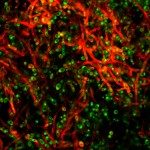Lien vers Pubmed [PMID] – 24476388
Clin. Microbiol. Infect. 2014 Sep;20(9):929-35
An increasing number of infections due to Pseudallescheria/Scedosporium species has been reported during the past decades, both in immunocompromised and immunocompetent patients. Additionally, these fungi are now recognized worldwide as common agents of fungal colonization of the airways in cystic fibrosis patients, which represents a risk factor for disseminated infections after lung transplantation. Currently six species are described within the Pseudallescheria/Scedosporium genus, including Scedosporium prolificans and species of the Pseudallescheria/Scedosporium apiospermum complex (i.e. S. apiospermum sensu stricto, Pseudallescheria boydii, Scedosporium aurantiacum, Pseudallescheria minutispora and Scedosporium dehoogii). Precise identification of clinical isolates at the species level is required because these species differ in their antifungal drug susceptibility patterns. Matrix-assisted laser desorption ionization (MALDI)-time of flight (TOF)/mass spectrometry (MS) is a powerful tool to rapidly identify moulds at the species level. We investigated the potential of this technology to discriminate Pseudallescheria/Scedosporium species. Forty-seven reference strains were used to build a reference database library. Profiles from 3-, 5- and 7-day-old cultures of each reference strain were analysed to identify species-specific discriminating profiles. The database was tested for accuracy using a set of 64 clinical or environmental isolates previously identified by multilocus sequencing. All isolates were unequivocally identified at the species level by MALDI-TOF/MS. Our results, obtained using a simple protocol, without prior protein extraction or standardization of the culture, demonstrate that MALDI-TOF/MS is a powerful tool for rapid identification of Pseudallescheria/Scedosporium species that cannot be currently identified by morphological examination in the clinical setting.
